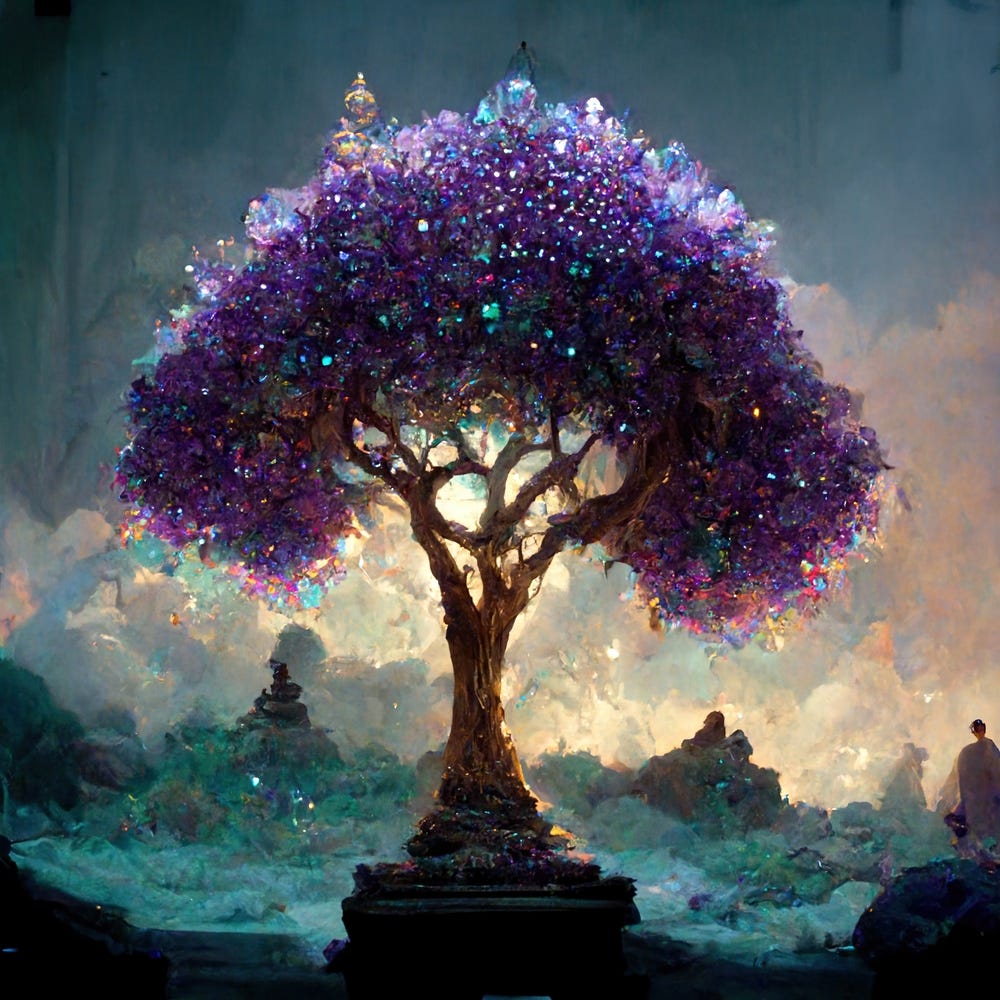Need an earlier part? Clicking the button takes you to a list of all episodes, with the first one at the bottom.
Gilgamesh went through the usual rituals for mourning Enkidu. He tore at his hair and beard. He ripped his splendid garments to shreds and scattered them in the wind. He spoke the usual lamentations.
The king carried out the rituals with unusual zeal, but they were not large enough to contain his grief. He wept enough tears to fill the Euphrates. He cried out loudly enough for his words to echo from the highest mountaintop.
Though he emerged from his mourning long enough to order the making of a jewel-encrusted gold statue of Enkidu and to order that all citizens of Uruk join him in his mourning, he otherwise ignored his royal duties and seldom left Enkidu’s body.
It was almost as if he expected Enkidu to come back to life. But his friend’s heart no longer beat. His lungs no longer breathed. His ears didn’t hear Gilgamesh’s pleas. His eyes did not open to behold the face of his friend.
Six days and seven nights Gilgamesh mourned his friend, refusing to allow his body to be buried. He finally relented only when a maggot crawled out of Enkidu’s nose. Even then, Gilgamesh gave permission slowly, as if the words were being ripped out of his throat.
Gilgamesh finally left the chamber where Enkidu’s body had lain, but only to visit his treasury to find riches that could be buried with his friend to ease his way in the afterlife. He piled up thirty weights of gold as well as an equal amount of ivory, silver, and iron. As if this were not enough, he also found for Enkidu both a sword and an axe with golden handles, as well as a gold inlaid bow with ivory arrows.
None of this treasure would help Enkidu in the Netherworld, but the elders and priests, fearing the look in Gilgamesh’s eyes, did not contradict him when he wasted such a wealth of raw materials and goods that would serve only grave robbers if they served anyone at all.
Gilgamesh’s offerings to the gods raised fewer doubts, even though the gods did not generally intervene in the afterlife.
For Inanna, Gilgamesh offered a javelin made from sacred wood. For Nanna, the moon god, he offered an alabaster cup. To Irkalla, Netherworld queen, he offered a lapis lazuli cup. To Dumuzi, Innana’s husband who was in the realm of the dead only six months out of the year, he offered a carnelian flute. He also made rich offerings to all of the Netherworld officials. In each case, he asked that the deities he invoked welcome Enkidu to the Netherworld and walk by his side.
Angry as Inanna had been with Gilgamesh, she didn’t take the opportunity to refuse his gift and deny his request. But she had no intention of helping Enkidu in any way. Neither did any of the of other invoked gods. Death was death, after all. None of them were inclined to play favorites in the way that Gilgamesh so clearly wanted.
Making one last attempt, Gilgamesh had a sacred table brought in. He filled a carnelian bowl with honey and set it on the table. He filled a lapis lazuli bowl with cream and set it on the table. Then he offered the bowls and their contents to Utu, his most steadfast ally among the gods.
Alone among the invoked deities, Utu would have helped if he could have. But as the sun god, he had no authority in the Netherworld. Nor did he think Irkalla would listen to him—or even allow him to enter. Inanna had tried a sisterly visit, and it had proved a miserable failure. Why would Utu have any better luck?
Gilgamesh, feeling dead inside, left Uruk to wander in the wilderness, Enkidu’s original home. But such a pilgrimage brought him no solace. Instead, he felt death in every cool breeze, heard death in every faint insect buzz, saw death in every shadow.
Death had taken Enkidu. But Death, always insatiable, would not stop until he had Gilgamesh as well. The king of Uruk was all too familiar with Death now. And though the king might be two-thirds god, he was still mortal enough to die.
As the days passed, Gilgamesh recalled that two mortals had actually been spared from death: the two survivors of the Great Flood, Ziusudra and his wife. If the king could reach the end of the Earth and speak to Ziusudra, he might learn the secret of eternal life.
Nobody was around to tell Gilgamesh how insane this idea was. Indeed, he would not have listened even if there had been.
Gilgamesh set off expecting to receive some divine guidance, but he slept without dreaming. The next morning he silently cursed the gods, who seemed to have abandoned him despite his best efforts to gain their aid. Nearby, he saw a pride of lions, full of life and unafraid—even of death. He slaughtered them to teach them their error of their ways.
After eating their meat and donning their pelts, Gilgamesh dug wells and drank from them. He had no idea where to dig, yet he found water each time. Was this a sign of favor from the gods or just some cruel joke at his expense? He wasn’t sure. Nor did he care, for he thought they had abandoned him, anyway. He would find the secret of eternal life without their help.
To demonstrate his resolve, Gilgamesh tried to catch the wind. He failed but continued to try.
This was too much for Utu, who spoke from the heavens, “Gilgamesh, why are you doing this? You will never find eternal life.”
“The worst that could happen to me would be that I would die in the attempt,” replied Gilgamesh. “But I will die sooner or later, regardless of what I do. I have nothing to lose. In any case, I would rather stay out in the sun, which cannot be seen in the realm of the dead, than take myself back to the shadows of Uruk. I will have plenty of time to live in the shadows after I am dead.”
Utu wanted to say more, but he decided not to press Gilgamesh, who clearly had no intention of listening, anyway. The sun god was more willing to forgive him his disregard of divine guidance than most gods were. But he continued to watch, hoping for a better opportunity to convince Gilgamesh to turn back.
No such opportunity came. Gilgamesh traveled farther than any man had ever traveled before. At last he came to Mashu Mountain. Its base touched the Netherworld, and its peaks touched the sky. Seeing it, Gilgamesh was reminded of Enkidu’s dream, in which he seemed to float between earth and sky. Could he have foreseen this moment?
Between the mountain’s two peaks lay the path by which the sun rose. It was guarded by two gigantic hybrid beings, part human and part scorpion, husband and wife. The sight of them shook Gilgamesh, now painfully conscious of how easy it would be for him to die. But because he had no choice, he approached them.
As he came closer, Scorpion Male looked at Gilgamesh and could hardly believe what he saw. “His flesh is like that of the gods,” he said.
“He is two-thirds god and only one-third man said Scorpion Female.
Neither had ever seen anyone like him before. Hence, they allowed him to approach, even though they were supposed to prevent any mortal from passing.
“What are you doing here?” asked Scorpion Male. “You have travelled a hard road that hardly anyone survives, but to what end? There is nothing for a man—even one such as yourself.”
“I am Gilgamesh. I have come from Uruk to find Ziusudra and learn from him the secret of eternal life.”
“The way forward is many times harder than the way back,” said Scorpion Male. “Likely, the attempt will kill you rather than reward you with eternal life.”
“Husband, we have no instructions on what to do with a part-god such as Gilgamesh,” said Scorpion Female. “Can you not see how filled with sorrow he is? I fear that if we turn him away, he shall die. Therefore, open the gate, that he may pass.”
“He will almost certainly die if he continues,” said Scorpion Male. “Nonetheless, I shall do as you request. Gilgamesh, the way is open to you. But take care, for the road ahead is treacherous.”
Gilgamesh thanked the scorpions but ignored the warning. He knew that Scorpion Female was right. He would die if he turned back. Only ahead was there any hope of life.
Beyond the gate lay The Way of the Sun, the darkness through which Utu himself had to pass to rise once again. It was like a lightless cave, except that it seemed to go on forever. Hour after hour, Gilgamesh kept running forward, step by step, but he couldn’t tell whether he made true progress or not. The only indication of any movement at all was that he could feel the chill of the north wind more than he had in the beginning.
Was this place designed to frighten mortals into turning back? If so, it had the opposite effect on Gilgamesh, who ran toward his goal even faster.
When he finally emerged from The Way of the Sun, he had to cover his eyes for a moment to adjust to Utu’s brilliant rays, which were now shining down on him.
Once his eyes had adjusted, he found himself in the Garden of the Gods. Trees flourished everywhere, their branches laden with precious gems rather than fruit. Diamonds, emeralds, rubies, and every other gem imaginable glittered in the sunlight that found its way through the lapis lazuli leaves.
As the breeze rustled through the tree branches, Gilgamesh heard the voice of Utu.
“Gilgamesh, you have come where no man has ever been before—or ever will be again. Why do you exert yourself so hard to reach a goal that does not exist? Whatever you do, you will not find eternal life.”
Once, Gilgamesh had listened to Utu. But no more.
“Perhaps my life is as limited as you say. But even if that is true, should I not experience everything I can? Should I not take every opportunity to feel the sun on my face before I descend forever into the shadows? I will finish my quest, whether it leads me to eternal life or not.”
Utu sighed in the wind, but he said no more. Gilgamesh was too stubborn to listen.
As Gilgamesh walked away, turning his back on both the garden and Utu, he wondered how much farther he could go. Everyone had tried to warn him that his quest was in vain. Yet no one had expected him to get this far.
What if everyone was wrong? What if he could do the impossible?
And if he could, what else might he be able to do?
Could he bring Enkidu back to life?








